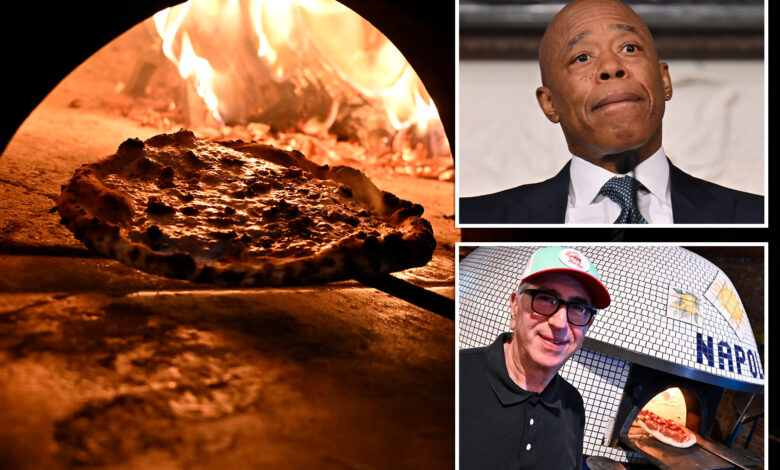NYC burns pizzerias with new rule cutting smoky pollutants by 75%

New York City has quietly approved a controversial green plan to require pizzerias and matzah bakeries using decades-old wood- and coal-fired stoves to cut their smoky pollutants by 75%.
Mayor Eric Adams’ Department of Environmental Protection said the fresh edict takes effect April 27, with some city businesses having already coughed up more than $600,000 for new smoke-eating systems in anticipation of the expected mandate.
“You are going after pizza? Glorious New York pizza?” groused Mike Dabin in a recent online comment to the city DEP. “Can’t you go after Diesel Trucks instead of pizza ovens?”
Businesses using wood and anthracite stoves can apply for a variance but need evidence to prove they are unable to comply with the mandate.
Pizza lovers and some entrepreneurs went bonkers when The Post first reported on the proposed rule last summer, worried that the dough needed to comply with the measure would put beloved spots out of business — or at least affect the taste of their tomato and mozzarella slices.
But Adams has defended the mandate for the Big Apple, which was recently named the most expensive city to get a slice of pizza in the country.
“The scientific evidence is clear that reducing emissions of fine particulate matter will improve the health of New Yorkers and reduce hospital visits and costs, without changing the amazing taste of NYC pizza,” DEP rep Edward Timbers insisted in an emailed statement to The Post on Sunday.
About 130 Big Apple businesses will be affected by the new rule, the city said.
The DEP received 155 online comments about the plan before it was approved, with most opposing it.
“This is an egregious overstep of the state and local government, and puts an unreasonable burden on small businesses that have already endured tremendous hardships over the last 3 years,” said Marc Hellman.
“If the government wants to improve air quality, and force businesses to do it, it should provide the equipment free of charge rather than putting the burden on the businesses themselves. This simply isn’t a priority in a city that is in desperate need of numerous improvements,” Hellman wrote.
Joan Barons added, “Please grandfather old coal oven institutions without requiring them to install scrubbers.
“This rule is a joke,” Barons said. “Don’t punish small business and pizza lovers!”
Some pie-flippers who make pizza using the traditional baking method said they have already eaten the extra cost and implemented the required new air-filtration systems — known as a flue exhaust — to abide by the upcoming edict.
Grimaldi’s Pizza, which has coal-brick restaurants in Manhattan, Brooklyn and Queens, has or is in the process of installing the smoke-eating systems at all three locations, said co-owner Anthony Piscina.
It is costing Grimaldi’s at Limelight in Manhattan $50,000 to install the filtration system because of added costs to protect the integrity of the historic gothic structure that was once a church before becoming a nightclub, Piscina said.
“We have to do it. We can’t cook pizza any other way,” Piscina said.
He said the ovens have to reach a temperature of 1,200 degrees to properly cook the slice, and only coal-fired ovens do that.
Popular Paulie Gee’s Pizza in Greenpoint, Brooklyn, which uses wood-fired ovens, installed a smoke-reduction emissions exhaust system before the coronavirus pandemic hit, when the proposed rule was first discussed and then postponed.
“It’s a big deal. I did what I needed to do. It’s better than closing,” said Paulie Gee’s owner Paul Giannone, celebrating his 14th year in business.
It cost $20,000 in dough to comply, he said.
Giannone said a neighbor had complained about the smoke spewing from the pizzeria.
While he said there is merit to curbing smokey exhaust and bolstering public health, it has become more difficult for pizzerias wanting to use the traditional baking method to open, given the new added cost. Most other pie joints use gas-powered ovens.
“I don’t see many people opening wood- and charcoal-fired pizzerias. It’s too much of an expense,” Giannone said.
John’s of Bleecker Street — one of the oldest coal-fired pizzerias in the country — spent more than $100,000 to install its smoke-reduction system.
“We were told we had no choice. We have no business without our oven,” said manager Joey Schirripa. “We understand the direction the city is going in. We want to be environmentally friendly.”
Schirippa said the business’s infiltration system — which snakes six stories up through the chimney — has not affected the taste of its famed coal-charred pies.
Alter Eckstein, a manager of the Satmar Broadway Matzah Bakery, has said his shop has already spent more than $600,000 on filtering systems in anticipation of the new rules.
But he said the change is not all about money.
“This is the religious tradition. … This is how we bake for the past thousands of years, and we don’t want to change anything,” he told The Post over the summer.
The rule covers ovens installed before May 2016.
The DEP said the new rule is enforcing a law approved in 2015 by the City Council and then-Mayor Bill de Blasio requiring pollutant-spewing coal- and wood-fired pizzerias to dramatically curb their unhealthy emission of particulate matter, which is known to cause asthma and other respiratory ills.
The department said it consulted with an advisory committee consisting of restaurateurs to come up with the rule.
Under the mandate, eateries using coal- and wood-fired stoves must install an emission control system to reduce air pollutants by 75%.
If a pie maker or bakery can’t cut emissions, the owner must submit an assessment explaining why the eatery can’t comply and apply for a variance to be exempt from the rule.




